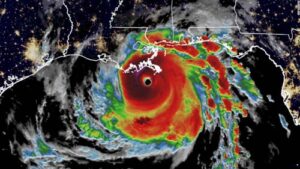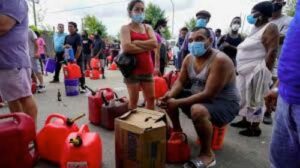It’s Time for a Power Shift in Louisiana
 On August 25, Hurricane Ida, a Category 4 hurricane, whipped through Louisiana. Though Ida was the one of the strongest to hit the Gulf Coast, it was not just the storm that was responsible for the suffering Louisianans would incur in the coming weeks and months. The day after the storm, Louisiana’s leading utility company, Entergy, left 1 million homes without power across the state—including the entirety of New Orleans.
On August 25, Hurricane Ida, a Category 4 hurricane, whipped through Louisiana. Though Ida was the one of the strongest to hit the Gulf Coast, it was not just the storm that was responsible for the suffering Louisianans would incur in the coming weeks and months. The day after the storm, Louisiana’s leading utility company, Entergy, left 1 million homes without power across the state—including the entirety of New Orleans.
 Power would not be restored in New Orleans for two weeks after the storm. As of Sept 29, one month after the storm, 5,000 Entergy customers were still waiting for lights to come back on. In areas that Entergy swore the power had been restored to, residents begged to differ—many still couldn’t use their electricity. In response to those pleas, Entergy conceded that although power may be flowing through the grid in those areas, homes and buildings still may not have access to that power due to further structural damage—and the owners of those buildings are responsible for repairs before they can have electricity again!
Power would not be restored in New Orleans for two weeks after the storm. As of Sept 29, one month after the storm, 5,000 Entergy customers were still waiting for lights to come back on. In areas that Entergy swore the power had been restored to, residents begged to differ—many still couldn’t use their electricity. In response to those pleas, Entergy conceded that although power may be flowing through the grid in those areas, homes and buildings still may not have access to that power due to further structural damage—and the owners of those buildings are responsible for repairs before they can have electricity again!
 Louisiana has already seen the ugliness and destruction that climate change continues to bring to the table. Companies like Entergy are carving that path forward by continuing to get their energy from fossil fuels. Not only does Entergy vehemently support the fossil fuel industry, but it actively, and sometimes illegally, stands in the way of change. In 2018, Entergy hired paid actors to attend City Council meetings to express support for new power stations in New Orleans. And when New Orleans passed a “resilient renewable portfolio standard” to “strengthen climate resistance” on the grid, Entergy threatened to sue the city.
Louisiana has already seen the ugliness and destruction that climate change continues to bring to the table. Companies like Entergy are carving that path forward by continuing to get their energy from fossil fuels. Not only does Entergy vehemently support the fossil fuel industry, but it actively, and sometimes illegally, stands in the way of change. In 2018, Entergy hired paid actors to attend City Council meetings to express support for new power stations in New Orleans. And when New Orleans passed a “resilient renewable portfolio standard” to “strengthen climate resistance” on the grid, Entergy threatened to sue the city.
As of now, 56% of Entergy’s power for New Orleans comes from natural gas, 34% from nuclear power, 9% from other regional utilities, and a mere 1% from renewable energy. In 2020, the New Orleans City Council passed legislation that requires Entergy to have net-zero carbon emissions by 2050, and restricts it from emitting any carbon by that time (as opposed to continuing to produce carbon while buying carbon offsets). It should be noted that this plan still includes nuclear energy, which still generates radioactive waste. While it’s certainly a huge step forward, Entergy can simply pay fees to evade this renewable energy requirement when the deadline approaches. Furthermore, Entergy has also proposed raising the rate for account holders to fund its transition to renewable energy, as well as infrastructure improvement (note that Entergy spent $1.2 billion on “infrastructure improvements” after 2020’s Hurricane Laura, yet all eight transmission lines still failed during Ida).
 It’s time for a change in power—and it needs to happen quicker than 2050. New Orleans needs to make the shift to reliance on renewable energy rather than fossil fuels, which only propels the climate crisis. Solar panels with battery storage, as well as microgrids, are where we need to start. The few Louisianans who had solar panels and battery systems on their homes during Ida were able to focus on clean-up, food, and their helping neighbors in the days after the storm. More systems like that certainly could have prevented the more than fifteen needless deaths from heat exhaustion and carbon monoxide poisoning after the storm.
It’s time for a change in power—and it needs to happen quicker than 2050. New Orleans needs to make the shift to reliance on renewable energy rather than fossil fuels, which only propels the climate crisis. Solar panels with battery storage, as well as microgrids, are where we need to start. The few Louisianans who had solar panels and battery systems on their homes during Ida were able to focus on clean-up, food, and their helping neighbors in the days after the storm. More systems like that certainly could have prevented the more than fifteen needless deaths from heat exhaustion and carbon monoxide poisoning after the storm.
 In addition to merely incorporating solar panels into the Louisiana systems, microgrids are the next wave. Microgrids are “self-powered islands of solar power, batteries, and backup generation” that are distributed throughout the communities they are serving. Ida knocked out all eight transmission lines that connected New Orleans to the regional grid. Microgrids would have more of a fighting chance to leave some communities, businesses, and homes with electricity, while the neighboring lines are getting repairs.
In addition to merely incorporating solar panels into the Louisiana systems, microgrids are the next wave. Microgrids are “self-powered islands of solar power, batteries, and backup generation” that are distributed throughout the communities they are serving. Ida knocked out all eight transmission lines that connected New Orleans to the regional grid. Microgrids would have more of a fighting chance to leave some communities, businesses, and homes with electricity, while the neighboring lines are getting repairs.
The shift to renewables will be a costly feat. Nevertheless, the climate, financial and health costs of remaining reliant on a fossil fuel-based system exceeds any monetary cost of renewables. In the end, renewable energy will pay itself off, so long as we act now.
 RCC Fellow — Sara Heimlich — Tulane University
RCC Fellow — Sara Heimlich — Tulane University
Sara Heimlich is a senior at Tulane University majoring in Environmental Studies and Political Science, with minors in History and Psychology.
![]() The Rachel Carson Council depends on tax-deductible gifts from concerned individuals like you. Please help if you can.
The Rachel Carson Council depends on tax-deductible gifts from concerned individuals like you. Please help if you can.
![]() Sign up here to receive the RCC E-News and other RCC newsletters, information and alerts.
Sign up here to receive the RCC E-News and other RCC newsletters, information and alerts.